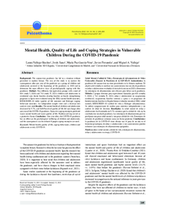Background:
The coronavirus pandemic has led to a situation without precedent in modern history. The aim of this study is to analyse the consequences after one year of the pandemic on a group of children and adolescents assessed at the beginning of the pandemic in 2020 and to determine the most effective ways of psychologically coping with this pandemic.
Method:
Two different, but equivalent, groups with a total of 604 (study I, 2020) and 743 (study II, 2021) children and adolescents in residential care, foster families, kinship families or family strengthening programs in Spain were evaluated using the SDQ (mental health measure), KIDSCREEN-10 index (quality of life measure) and Kidcope (coping behaviour measure). An independent sample t-test and a decision tree analysis were used.
Results:
The mental health of children and adolescents decreased by 9.7%, and self-perceived quality of life did not change after one year of the COVID-19 pandemic. Nonactive coping strategies predicted worse mental health and worse quality of life. Problem solving served as a protective factor.
Conclusion:
One year after, the COVID-19 pandemic has an effect on the psychological wellbeing of children and adolescents, and the consequences can be reduced if proper coping strategies are used.

